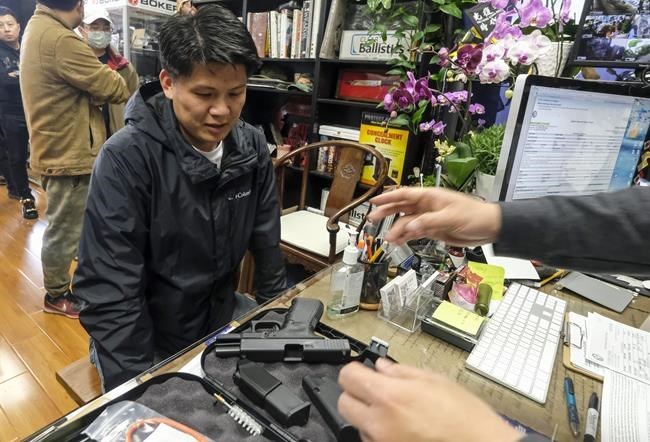LOS ANGELES (AP) ŌĆö A U.S. appeals court ruled Wednesday that CaliforniaŌĆÖs ban on the sale of semiautomatic weapons to adults under 21 is unconstitutional.
In a 2-1 ruling, a panel of the San Francisco-based 9th U.S. Circuit Court of Appeals said Wednesday the law violates the Second Amendment right to bear arms and a San Diego judge should have blocked what it called ŌĆ£an almost total ban on semiautomatic centerfire riflesŌĆØ for young adults. ŌĆ£America would not exist without the heroism of the young adults who fought and died in our revolutionary army," Judge Ryan Nelson wrote. "Today we reaffirm that our Constitution still protects the right that enabled their sacrifice: the right of young adults to keep and bear arms.ŌĆØ
The Firearms Policy Coalition, which brought the case, said the ruling makes it optimistic age-based gun bans will be overturned in other courts.
Adam Winkler, a law professor at the University of California, Los Angeles, said the decision is a clear sign of how courts, including the U.S. Supreme Court which has a major gun case before it, are expanding gun rights.
ŌĆ£Federal judges can read the tea leaves,ŌĆØ Winkler said. ŌĆ£In the coming years, the courts seem certain to strike down numerous gun safety measures in the name of the 2nd Amendment. This 9th Circuit ruling is a harbinger of things to come.ŌĆØ
The ruling, however, was not a total victory for gun rights advocates.
They also sought an injunction blocking the state from requiring a hunting license for adults under 21 ŌĆö who are not in the military or law enforcement ŌĆö to purchase rifles or shotguns.
Handgun sales to those under 21 were already prohibited when the hunting license requirement was passed in 2018 after some of the nationŌĆÖs worst mass shootings were committed by young adults using rifles, including the at Marjory Stoneman Douglas High School in Parkland, Florida.
The following year, the Legislature acted to address what they saw as a loophole after an in San Diego County.
A 19-year-old armed with a semiautomatic rifle he had just purchased with a hunting license killed a 60-year-old woman and injured three others, including the rabbi and an 8-year-old girl at Chabad of Poway.
The state passed the law banning sales of semiautomatic centerfire rifles to anyone under 21. There were exemptions for police or military troops but not for those with hunting licenses.
Matthew Jones, a 20-year-old at the time from Santee in San Diego County, originally sued saying he wanted a gun to defend himself and other lawful purposes but didn't want to obtain a hunting license.
His lawsuit, which had been filed before the under-age ban on semiautomatic weapons, was amended to also challenge that law.
The suit said the state had ŌĆ£whittled down (the) already inapplicable and irrelevant hunting license ŌĆśexemptionŌĆÖ ŌĆö the only exemption that is even possible for an ordinary, law abiding young adult who does not wish to enter into a highly dangerous career in law enforcement or the military ŌĆö by prohibiting an entire class of firearms.ŌĆØ
The 9th Circuit ruled the hunting license requirement was reasonable for increasing public safety through ŌĆ£sensible firearm control.ŌĆØ
But it said an outright ban on semiautomatic rifles for those under 21 went too far.
ŌĆ£ItŌĆÖs one thing to say that young adults must take a course and purchase a hunting license before obtaining certain firearms,ŌĆØ Nelson wrote. "But to say that they must become police officers or join the military? ... It is a blanket ban for everyone except police officers and servicemembers."
Nelson and Judge Kenneth Lee, who ruled in the majority, were part of Republican President Donald Trump's wave of conservative-approved nominees that reshaped the famously liberal court.
Two years ago, Lee authored a 2-1 decision that threw out CaliforniaŌĆÖs ban on high-capacity ammunition magazines, saying the law violated the U.S. ConstitutionŌĆÖs protection of the right to bear firearms. That ruling was later overturned by the court's 7-4 review of the decision.
A dissent was written by U.S. District Court Judge Sidney Stein, who was assigned to the panel from the Southern District of New York. Stein was nominated to that court by Democratic President Bill Clinton.
Stein said he would have upheld the lower court's decision not to block either law.
Stein said the regulation did not place a ŌĆ£severe burdenŌĆØ on gun ownership rights on young adults and noted they could get semiautomatic rifles from family members or borrow them from others.
He also said the majority failed to consider the the disproportionate amount of violent crime committed by those under 21 who have relatively less mature cognitive development.
Democratic Sen. Anthony Portantino of La Ca├▒ada Flintridge, who wrote both laws, said he was disappointed the semiautomatic ban was struck down but was pleased the hunting license requirement survived.
ŌĆ£I remain committed to keeping deadly weapons out of the wrong hands,ŌĆØ Portantino said. "Student safety on our campuses is something we should all rally behind and sensible gun control is part of that solution.ŌĆØ
Attorney General Rob Bonta's office said it was reviewing the decision. In a statement, a spokesperson said it was committed to ŌĆ£defending CaliforniaŌĆÖs commonsense gun laws.ŌĆØ
Brian Melley, The Associated Press

